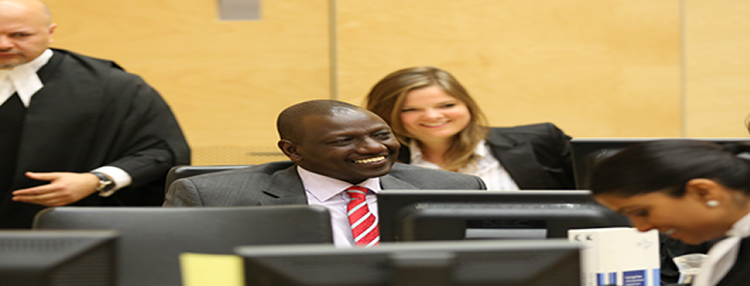A fresh twist has emerged in the witness tampering cases at the International Criminal Court after lawyers for Deputy President William Ruto demanded a special prosecutor to investigate prosecution witnesses for lying.
The application before Trial Chamber V(a) comes barely a month after a majority of the judges terminated the trial of Mr Ruto and his co-accused Joshua arap Sang without acquitting them of crimes against humanity charges. ICC Prosecutor Fatou Bensouda had already obtained three warrants of arrest against Kenyans Walter Barasa, Paul Gicheru and Philip Kipkoech Bett for alleged witness interference in the case, which one judge noted had collapsed because of witness tampering and political meddling.
The Ruto Defence team has highlighted four prosecution witnesses it says should be investigated, alongside any other individuals, for offences against the administration of justice.
In a heavily redacted May 2, 2016 filing posted on the ICC website, lawyer Karim Khan claims that prosecution witnesses lied and intermediaries as well as officials in the ICC’s Office of the Prosecutor tampered with the collection of evidence by identifying and coaching witnesses. The Ruto team also claims that ICC staff members might have engaged in sexual relations with witnesses and their families, and were party to false financial claims made on the Victims and Witnesses Unit.
“By encouraging … and assisting OTP witnesses to defraud the ICC, these ICC staff members have fostered an environment in which defrauding and telling lies to the ICC was encouraged,” says Mr Khan in court papers.
A report by a cellphone site data analyst reportedly shows that one witness lied about his whereabouts during the post-election violence, lied about where he was registered to vote, and made false claims about losing land his family had sold 20 years earlier. Other cellphone data analyses show another witness was in Nairobi at the time he claimed to have been in the Rift Valley.
Mr Khan claims that although he has previously asked for an investigation into the claims, the OTP “has proved to be unwilling or unable to pursue investigations against its own witnesses and intermediaries”, hence his request for a special prosecutor.
Mr Khan says that he repeatedly alerted the prosecution in court as well as in private meetings with Deputy Prosecutor James Stewart of his concerns, which were not acted upon. He recalls a meeting in March 2014 where he asked for an independent investigator reporting directly to the Prosecutor and Deputy Prosecutor, but reports that Mr Stewart emailed him rejecting the offer. He suggests that the OTP’s reluctance to pursue independent investigations against its witnesses could be aimed at shielding its own staff caught up in wrongdoing.
“No witness should have a licence to lie with impunity or cause false evidence to be given to a prosecution authority,” says Mr Khan in the filling, arguing that there has been no delay in launching investigations into “other individuals”.
He argues that despite Trial Chamber V (a) terminating the Ruto-Sang case, it retains a limited residual jurisdiction to determine whether or not to order the investigation to protect the administration of justice.
He wants the independent “amicus prosecutor” to report only to the Prosecutor and Deputy Prosecutor to avoid any conflicts of interest, and to regularly update the judges and the Ruto Defence team because they are the complainants.
Alternatively, Mr Khan suggests, the judges should send the matter to the Kenyan authorities for investigation and prosecution. Kenya’s Attorney General has suggested that the witness interference cases against Mr Barasa, Mr Gicheru and Mr Bett be tried in the country.







